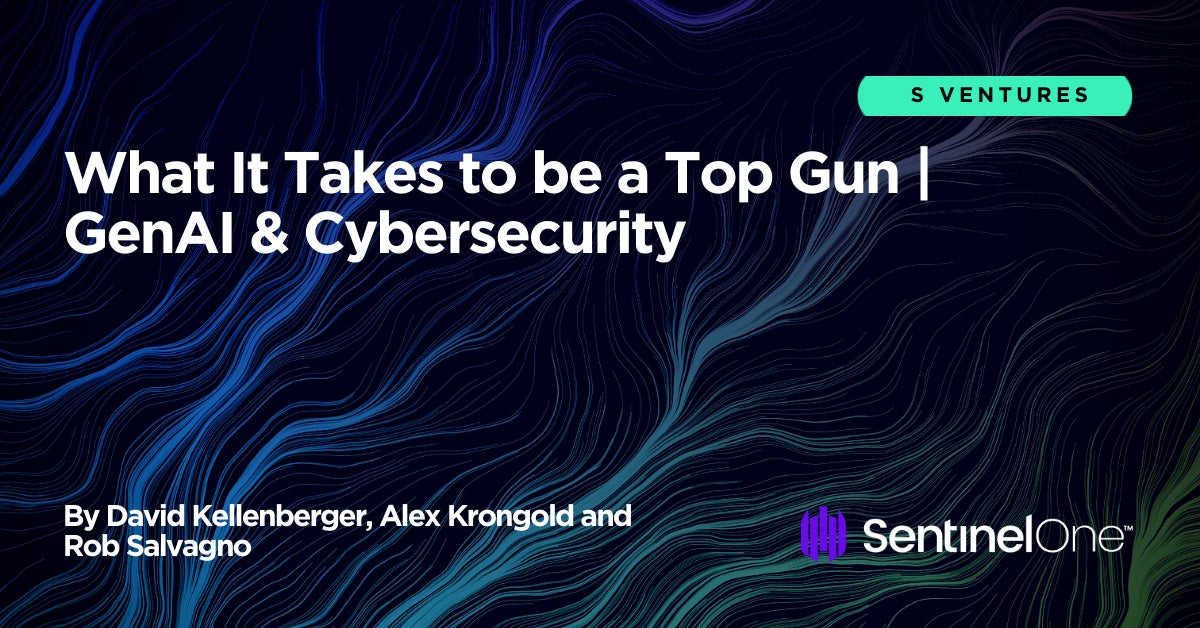We believe that generative AI has the potential to generate massive value and disrupt existing industries and applications. We are now witnessing generative AI accomplish things on a daily basis that just a short time ago did not seem possible.
Generative AI has a meaningful role to play in cybersecurity, both for the good guys and the bad ones. Our motto at SentinelOne has been to be a “Force for Good”, and we intend to be a Force for Good in bringing advanced AI capabilities into cybersecurity as well.

At SentinelOne, AI has always been at the core of what we do – many years ago we introduced static AI detection models as part of our endpoint security platform that vastly improved the ability to detect potential threats versus the previous signature based approaches used in the market up to that point. At RSA 2023, we showcased the power of using generative AI in cyber with our introduction of Purple AI, which turns every security analyst into a super analyst. Purple AI significantly increases analyst productivity by reducing layers of complexity needed in generating insights and automating their ability to take action on threats and other issues surfaced via Purple.
Cybersecurity has a jobs issue, there are simply not enough trained cybersecurity professionals to meet the needs in the market – professionals who are trained to protect your favorite application, service, financial institution, utility, etc. Thus generative AI is just what cybersecurity needs – a force multiplier for security experts, for those on the good side of the equation.
What Have We Learned about Generative AI and Cybersecurity?
So what have we learned about generative AI and cybersecurity? We’ve said before that security is a data problem, and as it turns out, generative AI is ultimately a data problem as well. ChatGPT amazed the world because it provided a highly human compatible interface to the internet’s endless catalog of data. Since then we’ve seen many companies introduce “co-pilots” on top of their existing applications in many sectors – security, CRM, content creation, HR, etc.
The rapid adoption of Generative AI and LLMs technologies brings unique challenges and opportunities to the security space that will be felt in different ways than in other segments. In particular, at the same time that security analysts are gaining access to these productivity/force-multiplying tools, so are hackers and bad actors, which will in time allow them to create and execute attacks like never before. This will make it even more critical for companies to understand and adopt their own AI-based security strategy, in order to thwart a more sophisticated generation of attacks they are likely to see in the not-too-distant future.
Today’s co-pilot AI guides often use a combination of models – from open source, independent commercial LLMs, plus a vendor’s own proprietary models. These proprietary models can be tuned and trained by data specific to that vendor, often data that is gathered by the products and services it currently offers. The tuning and training performed on this data is what makes these models relevant and functional within a particular practice. The co-pilot approaches that ultimately graduate to being a Top Gun solution in their space will bring something truly transformative to their segment.
SentinelOne believes that transformational opportunities for generative AI will be driven by offerings that leverage a corpus of data that go well beyond a single vendor’s product and span an entire area or set of areas. After all, the data and information that defines a process or practice within an industry often spans multiple products.
For example, within security, it is not uncommon for an enterprise to be using between 50-100 different security tools. Today these tools define the customer’s security strategy, operations and collectively house the majority of data relative to this. GenAI’s ability to transform cybersecurity will depend in part on utilizing as much of this data as possible to introduce new capabilities never possible within a single set of tools.
Our goal with Purple AI is to do just that: provide enterprises a way to leverage the vast amount of security data spread across their security tools to create a new superpower against the evolving threat landscape, made possible through our Singularity Security DataLake.
How Does S Ventures Fit In?
So how does S Ventures fit in? We believe generative AI will give rise to an entire new tech stack, spanning core infrastructure, tools and services, and applications. LLMs will form a foundational component of the core infrastructure stack. Given the rarity of talent, funding requirements (for training and tuning new models) and ability to execute there will be a handful of players that can build a business around LLMs, perhaps most analogous to the emergence of AWS, GCP and Azure during the cloud era.
While many of these same players are also highly relevant in generative AI and LLMs today, many enterprise customers have a strong desire to avoid vendor lock-in and for a best of breed independent vendor that can cater to its specific business needs. These customers will want to establish their own unique value proposition with AI and will care about items such as customization, privacy, security, explainability and trust.
While some – particularly smaller and mid-sized customers – may be able to utilize off the shelf models, many larger customers will need more highly custom / configured models tuned for their environment. Customers may also require an enterprise level of support or engagement from their LLM provider, while others may have the sophistication to train and tune a combination of commercial and proprietary models themselves. Like in the previous cloud era, we believe both commercial and open source models will coexist alongside each other.
As part of this we are excited about our recent investment in Cohere, a leading LLM provider. Cohere has a mission – to help enable enterprises to adopt generational AI through the use of LLMs. The company has proven its ability to deliver top performing models. They have a world class technical team, that includes experts who came from GoogleBrain, DeepMind and Meta. As well as a great business team (including former operational execs from some of the largest tech companies in the world such as Google, Amazon, Apple, and Cisco) to help execute on their enterprise strategy.
Cohere understands what enterprises need – customization, data security, quality, a cloud agnostic approach and ability to deploy both on-prem and in the cloud. Cohere’s recent partnership with Oracle is a great early example of this.
We are excited about our investment in Cohere and their strong position to be one of the winners in the generative AI space.
